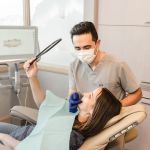What to Do If You Get an Infection After Dental Surgery
After my recent dental surgery, I faced a challenge I wasn't expecting: an infection. It was a situation that left me anxious and unsure of how to proceed. I found myself searching for answers, wondering what the signs were and what I could do to fix the issue before it got worse. In this article, I’m sharing my personal experience, the symptoms of an infection, and the steps I took to deal with it. If you find yourself in a similar situation, I hope my story can help guide you through the process.
1. Understanding Infection After Dental Surgery
First, it's important to understand what an infection is and why it might occur after dental surgery. Dental surgery, whether it’s a tooth extraction, root canal, or implant procedure, involves making incisions in your gums or other parts of your mouth. These incisions, even when done carefully, can introduce bacteria into the tissue, potentially leading to an infection.
In my case, after having a tooth removed, I began to notice signs of infection a few days into my recovery. It’s not uncommon for the healing process to include some swelling or discomfort, but there are key symptoms that signal something might be wrong. Knowing these symptoms early on helped me take action before things escalated.
2. Signs and Symptoms of an Infection
Recognizing the symptoms of infection early can prevent complications and help you get the right treatment. These are the key signs I experienced that made me realize I had an infection:
1. Increased Swelling and Redness
A little swelling and mild redness around the surgery site are normal in the first few days. However, I noticed that the swelling continued to grow rather than decrease, and the area became more inflamed. The redness spread, and it didn’t look like it was improving as expected.
2. Pus or Discharge
One of the most concerning signs I saw was a yellowish discharge coming from the surgery site. While it’s normal to have a little blood in the first 24 hours, pus is a clear indicator that there might be an infection. The presence of this discharge made me realize that I needed to act quickly to prevent the infection from worsening.
3. Persistent Pain
Although some pain is expected after surgery, the pain should gradually diminish. For me, the pain started to get more intense after a few days and didn’t seem to improve with the usual pain medication. I also began to feel sharp pain when touching or moving my tongue near the affected area, which was another red flag.
4. Fever and General Discomfort
As the infection progressed, I began to feel unwell in general. I developed a low-grade fever, which was my body’s way of fighting the infection. If you start to experience fever or chills after dental surgery, it’s a strong indicator that your body is trying to cope with an infection.
3. What to Do If You Notice These Symptoms
If you experience any of these symptoms after dental surgery, it’s crucial to seek professional help as soon as possible. Here’s what I did when I realized I had an infection:
1. Contact Your Dentist Immediately
As soon as I recognized the symptoms of an infection, I contacted my dentist’s office. They immediately advised me to come in for an examination. It’s important not to wait too long to reach out for help, as untreated infections can spread and lead to more serious complications like an abscess, bone damage, or even systemic infection.
2. Take Prescribed Antibiotics
After confirming that I had an infection, my dentist prescribed a course of antibiotics. Antibiotics are essential for fighting bacterial infections, and it’s important to complete the entire course, even if you start to feel better before it’s finished. I learned this lesson the hard way, as stopping antibiotics early can cause the infection to return stronger.
3. Follow Post-Surgery Care Instructions
Along with antibiotics, my dentist provided me with a set of post-surgery care instructions that included cleaning the area gently and avoiding certain foods. I followed these instructions to the letter, using a saltwater rinse and avoiding hot, spicy, or crunchy foods that could irritate the wound. Taking care of the surgical site and maintaining proper oral hygiene is key to preventing further infection.
4. Ice Packs and Pain Management
Managing the swelling and pain was another important part of my recovery. I used ice packs on my cheek for 20 minutes at a time to reduce swelling. For pain relief, I relied on over-the-counter pain medications, such as ibuprofen, to keep the discomfort manageable. However, if the pain became severe, I contacted my dentist again for advice on stronger pain medications.
4. How to Prevent Infection After Dental Surgery
After experiencing an infection myself, I took a number of precautions in future surgeries to help prevent infection. These are the strategies I learned that helped protect my oral health:
1. Maintain Excellent Oral Hygiene
Keeping your mouth clean is crucial after dental surgery. I made sure to brush my teeth gently around the surgical site and rinse with salt water to keep bacteria at bay. I also avoided using mouthwash with alcohol, as it can irritate the healing tissue.
2. Follow Your Dentist’s Care Instructions
Every dentist has specific aftercare instructions tailored to your surgery. I realized that following these instructions precisely helped me avoid complications. Whether it’s eating soft foods, resting, or avoiding vigorous physical activity, these small steps go a long way in preventing infections.
3. Avoid Smoking and Alcohol
Both smoking and alcohol can slow down the healing process and increase the risk of infection. I learned the hard way that smoking constricts blood flow, making it harder for the body to fight off infection. After my surgery, I made sure to avoid smoking and limit alcohol consumption to give my body the best chance to heal.
4. Take Antibiotics as Prescribed
For surgeries that increase the risk of infection, your dentist might prescribe antibiotics as a precaution. I always made sure to take them as directed, which significantly lowered my chances of developing an infection after surgery.
5. When to Seek Emergency Help
In some cases, an infection can become more severe, requiring urgent attention. If you experience any of the following, it’s important to seek emergency dental care immediately:
- Severe swelling in your face or neck area
- Difficulty breathing or swallowing
- Persistent fever that doesn’t go down with medication
- Signs of a spreading infection, such as red streaks near the wound
If any of these occur, don’t wait. Get to an emergency dentist or hospital to prevent further complications.







 All Smiles By Design4.0 (549 review)
All Smiles By Design4.0 (549 review) Soundview Dental Arts5.0 (19 review)
Soundview Dental Arts5.0 (19 review) Gentle Dental Moreno Valley4.0 (147 review)
Gentle Dental Moreno Valley4.0 (147 review) My Smile Care4.0 (548 review)
My Smile Care4.0 (548 review) Metro Smiles Gage Park2.0 (36 review)
Metro Smiles Gage Park2.0 (36 review) Northeast Periodontal Specialists4.0 (100 review)
Northeast Periodontal Specialists4.0 (100 review) The Importance of Oral Health Education During Pregnancy for a Healthy Pregnancy
The Importance of Oral Health Education During Pregnancy for a Healthy Pregnancy Best Tips for Brushing Your Teeth Properly for Healthy Gums: Essential Techniques for Oral Health
Best Tips for Brushing Your Teeth Properly for Healthy Gums: Essential Techniques for Oral Health Why Skipping Dental Checkups Can Lead to Bigger Oral Health Problems
Why Skipping Dental Checkups Can Lead to Bigger Oral Health Problems Advantages of Porcelain Dental Restorations
Advantages of Porcelain Dental Restorations How Can Diabetes Cause Tooth and Gum Problems? Preventing and Managing Oral Health Issues
How Can Diabetes Cause Tooth and Gum Problems? Preventing and Managing Oral Health Issues Healthy Habits for Promoting Good Oral Health and Hygiene: Tips for a Healthy Smile
Healthy Habits for Promoting Good Oral Health and Hygiene: Tips for a Healthy Smile